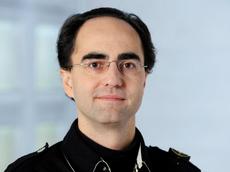At the interface of pharmaceutics
Jean-Christophe Leroux is a trained pharmacist. Today, he explores the boundaries between chemistry, biology and pharmaceutics with a view to creating more effective medication with fewer side-effects.

What do
you consider to be chemistry’s greatest achievement or most important
discovery?
That’s a
difficult question; I’d say the answer largely depends on your own research
interests. In drug formulation, you can’t do any research without acknowledging
Paul J Flory and Irving Langmuir for their enormous contributions in the areas
of macromolecules and surface chemistry respectively. More recently, key
discoveries at the interface between biology and chemistry have revolutionized
the way pharmaceutical research is conducted today. These include the
development of the polymerase
chain reaction (PCR) method and the discovery of green fluorescent protein.
What do
you focus on in your research and what aspects of it are evident or usable in
everyday life?
I was
trained as a pharmacist, so I was always interested in both chemical and
medical science. In my lab, we’re trying to find better ways to administer
drugs. Our aim is to improve the efficacy of drugs or reduce their side-effects ̶ preferably
without altering the chemical structure of the compound. We develop
formulations which are often based on polymers and which influence important
biopharmaceutical parameters such as the absorption, biodistribution and elimination
of the drug. For instance, we are currently developing synthetic, nano-sized, virus-like
particles that could be used to protect and deliver nucleic acids such as siRNA
to specific cells. More generally, in everyday life whenever a patient takes a
tablet or some other form of dosage, he should realize that a lot of work has
gone into optimizing the formulation and ensuring both the chemical stability
and the efficacy of the active compound.
Have you
got a role model in chemistry? If so, who and why this person?
I have a
lot of admiration for researchers who can be at the forefront of several fields
at once. There are examples in our own department; but outside the ETH, the
work of Professor Jean M. J. Fréchet from UC Berkeley has always been a source
of inspiration for me. Although his research activities are extremely
diversified (organic, polymer, biological and materials chemistry), he often manages
to be ahead in many fields, such as polymer science, drug delivery,
nanotechnology etc.. In general, I also tend to admire great scientists who
haven’t got too much of an ego. Professor K. Matyjaszewski from Carnegie Mellon
University is very well known for his remarkable achievements in controlled
radical polymerization, but he’s remained a modest and extremely down-to-earth person.
How will
your research field develop? Where does the potential lie?
My
research field is evolving with the advances made in chemistry, biology and
medicine. Drug molecules are more and more complex (peptides, proteins, nucleic
acids) and their administration is becoming really challenging. We really need to
improve our understanding of how these newer drugs interact with the biological
milieu and cells in order to devise more effective delivery strategies. At the
same time, pharmaceutical scientists need to take biopharmaceutical constraints
into account very early on in the chemical design of the drug molecules to make
the formulation step more efficient. Today, with the rapid evolution of
supramolecular chemistry, our field has access to a wide variety of systems to
formulate complex drug molecules, and I’m convinced that the best is yet to
come.
What term from chemistry should everyone know by the
end of the International Year of Chemistry and why?
From a pharmaceutical
perspective, the word “excipient”. It relates to all non-pharmacological
chemical components that are contained in medication and allow the drug to do
its job in a clinical context.







READER COMMENTS